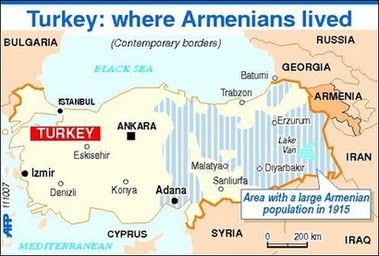International Relations
The Armenian Genocide
- 27 Apr 2021
- 5 min read
Why in News
Recently, the US President officially recognised the mass killings of Armenians by Ottoman Turks in 1915-16 as an act of genocide.
- The Armenian diaspora marks 24th April as Armenian Genocide Remembrance Day.
Key Points
- Genocide (Meaning):
- According to Article II of the United Nations (UN) Convention on Genocide of December 1948, genocide has been described as carrying out acts intended “to destroy, in whole or in part, a national, ethnic, racial or religious group”.
- Raphael Lemkin, the Polish lawyer, coined the term “genocide” in 1943.
- Armenian Genocide:
- The Armenian Genocide is called the first genocide of the 20th century.
- It refers to the systematic annihilation of Armenians in the Ottoman Empire from 1915 to 1917.
- After the First World War broke out in November 1914, the Ottoman Turks participated in the war, siding with Germany and the Austro-Hungarian empire.
- The Ottoman Turks believed the Armenians would side with Russia in the war. This resulted in the Ottoman Turks engaging in a mass-removal campaign of Armenians from the border areas along the Eastern Front.
- On 24th April, 1915, Ottoman Turkish government officials arrested and executed thousands of Armenian intellectuals. It was the start of the Armenian Genocide.
- Armenian families, including small children, were forced to walk for days without food, water and shelter in the deserts of Syria and Arabia.
- According to estimates, approximately 1.5 million Armenians died during the genocide, either in massacres and in killings, or from ill treatment, abuse and starvation.
- Significance of this Recognition:
- The acknowledgement by the US government will have little legal impact on Turkey, other than becoming a cause for embarrassment for the country and giving other countries the impetus to also acknowledge the genocide.
- According to the Armenian National Institute, 30 countries officially recognise the Armenian Genocide.
- The acknowledgement by the US government will have little legal impact on Turkey, other than becoming a cause for embarrassment for the country and giving other countries the impetus to also acknowledge the genocide.
- Turkey’s Response:
- Such moves would only set back the already strained relationship between US and Turkey, both of whom are North Atlantic Treaty Organization allies.
- Ties between the US and Turkey have been strained over a range of issues that include Turkey’s purchase of Russian S-400 defence systems, foreign policy differences with regard to Syria, human rights and other intersecting legal issues.
- Turkey has acknowledged that atrocities were committed against Armenians, but denies it was a genocide (which comes with legal implications) and challenges the estimates that 1.5 million were killed.
- Such moves would only set back the already strained relationship between US and Turkey, both of whom are North Atlantic Treaty Organization allies.
- India’s Stand:
- India, that has not formally recognised the Armenian Genocide has primarily adopted this stance in the interests of its wider foreign policy decisions and geo-political interests in the region.
- India does not have any domestic law on genocide, even though it has ratified the United Nations Convention on Genocide.
- This was even observed by the Delhi High Court in State v. Sajjan Kumar (2018). The case concerned the mass killing of Sikhs during the anti-Sikh riots in 1984 in Delhi — and throughout the country.
- India, that has not formally recognised the Armenian Genocide has primarily adopted this stance in the interests of its wider foreign policy decisions and geo-political interests in the region.
- Other Related News to Armenia:
- Armenia-Azerbaijan Conflict:
- Recently, Russia has brokered a new peace deal between Armenia and Azerbaijan. Both countries have been in a military conflict over the disputed region of Nagorno-Karabakh in the South Caucasus.
- Nagorno-Karabakh, the centre of the conflict, is located within Azerbaijan but is populated, mostly, by those of Armenian ethnicity (and mostly Christian compared to the Shia Muslim majority Azerbaijan).
- Armenia-Azerbaijan Conflict:







